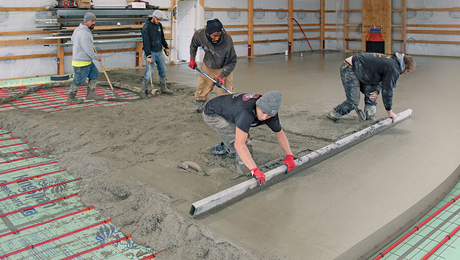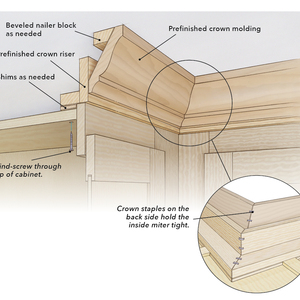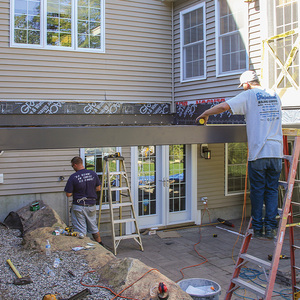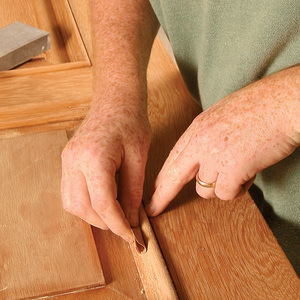With new house construction, is there ANY reason whatsoever to prime the walls (again, priming only) with oil base paint before painting the walls with latex paint?
Discussion Forum
Discussion Forum
Up Next
Video Shorts
Featured Story

Making your own heated floor assembly may save money, but it can also cause problems.
Featured Video
Builder’s Advocate: An Interview With ViewrailHighlights
"I have learned so much thanks to the searchable articles on the FHB website. I can confidently say that I expect to be a life-long subscriber." - M.K.
Fine Homebuilding Magazine
- Home Group
- Antique Trader
- Arts & Crafts Homes
- Bank Note Reporter
- Cabin Life
- Cuisine at Home
- Fine Gardening
- Fine Woodworking
- Green Building Advisor
- Garden Gate
- Horticulture
- Keep Craft Alive
- Log Home Living
- Military Trader/Vehicles
- Numismatic News
- Numismaster
- Old Cars Weekly
- Old House Journal
- Period Homes
- Popular Woodworking
- Script
- ShopNotes
- Sports Collectors Digest
- Threads
- Timber Home Living
- Traditional Building
- Woodsmith
- World Coin News
- Writer's Digest



















Replies
Nope. For severe stains , alcohol based B.I.N. primer is fine. Made by Zinnser, it is a white tinted shellac.
Spheramid Enterprises Architectural Woodworks
The secret to a long life is knowing when its time to go. M. Shocked
Should I assume whether this is interior or exterior, or could you say?
Welcome to the
Taunton University of Knowledge FHB Campus at Breaktime.
where ...
Excellence is its own reward!
If I were a betting man my odds would go with interior in that comments over an exterior percentage wise end up being called sides.
be usuallybesides
are you 'simple but elegeant'?
Edited 2/3/2007 5:48 pm ET by rez
Sorry, I guess that was a little bit caustic, wasn't it?Latex be just fine on interior walls
Welcome to the Taunton University of Knowledge FHB Campus at Breaktime. where ... Excellence is its own reward!
Good guess. You're right. I should have said interior. Thanks for bringing that to light.
If you are talking interior, there is no reason at all to use an oil based primer. But do use a primer, though, and don't just apply latex paint. A good primer (PVA is one suitable type) will even out the absorption difference between drywall and joint compound and you'll have a better finish.
If your finish colors will be dark, you can tint the primer in the direction of the finish color to help with coverage, though you'll always need two coats of finish to get a fine, opaque finish.
OK, what about over old paint, plaster, and plaster crack repair?
PVA or Latex?
Primers serve a number of different functions.One is bonding between the finish coat and the substrate.Another is to act as a filler to make the surface uniform as in PVA over DW.Another one is as a sealer to keep seal in stains or unknow old finishes.For a something like you are talking about I would use a latex stainblocking primer such as ProBlock, 123, etc. They also do a good job of bonding to "ordinary" wall surfaces..
.
A-holes. Hey every group has to have one. And I have been elected to be the one. I should make that my tagline.
"OK, what about over old paint, plaster, and plaster crack repair?
PVA or Latex?"Over old paint, alkyd (oil base) is best, a good latex is ok if the old surface has been well scuff sanded to give a good mechanical bond.Over plaster and plaster patches, latex is best, do not use PVA; see link below.http://literature.usg.com/pdf/PM15.pdfBruceT-BruceT
Oil or latex is fine. if it was my house w/ sheetrock walls I would do oil prime and 2 latex finish coats. Skimcoat blueboard, latex is fine, you don't even need a primer.
Yes there is. Oil base will soak in and consolidate the surface of drywall mud to be more robust. This especially helps on hand-applied textures that are mostly smooth, and on skimcoated smoothwall jobs.
Also, the latex you overcoat it with will not reliquify the oil primer, like can happen with latex primers. I like Zinsser's Cover-Stain oil primer, which can be topcoated with latex in 2 hours. It is essential to wear a charcoal respirator.
Bill
"Also, the latex you overcoat it with will not reliquify the oil primer, like can happen with latex primers."You must be thinking of PVA primers, which are water sensitive. Latex emulsions, once dried, form a film that will not "reliquify" under any sort of subsequent coatings. BruceT
I am well aware that latex does not reliquify once it is fully dry. However, that drying process takes a lot longer to be complete than the dry time needed before recoating the fast-drying oil primer.Another difficulty I have had with latex primers over joint compound is that the mud absorbs the water from the paint, leading to a weakened layer just beneath the paint film. If you overcoat too soon with a roller/brush, the primer can peel off, having failed in the mud, not at the primer bond line. This is especially a problem in the corners, which always dry more slowly than the rest.Bill
Bill... Completely agree with you... have had my share of cases where old latex wanted to bubble and peel off the wall from either skim-coating with JC or even just applying new latex paint. Nothing quite like skim coating, applying a latex primer, and watching all your hard work bubble and peel off the wall. Had an entire dining room do that to me once and was really not amused.
So, when in doubt I apply oil-based as a sealer before JC or further paint work. I haven't really run into problems with this approach. May add an extra step, but may also save loads of time in the long run.
Completely agree about using oil primer when in doubt. Check out this thread and my disaster photo.
72406.6
I've used oil primer on most all of my walls...five gal bucket of Zinnser went pretty far in each room. I especially like it on my new trim work.
After I prime I also give the primer a light sanding to knock the bumps off to obtain a really nice smooth finish.
If I already have my rollers and brushes out...why not do the best job possible?
Doesn't cost all that much more in the scope of things...its just a little more hassle cleaning up but what else is new?
Be well
andy...
Greek poet Archilochus said: "The fox knows many things, but the hedgehog knows one big thing"! From The Hedgehog & The Fox ~~~~ An essay on Tolstoy's view of history ~~ by Isaiah Berlin
http://WWW.CLIFFORDRENOVATIONS.COM
>>> After I prime I also give the primer a light sanding to knock the bumps off to obtain a really nice smooth finish.
If I already have my rollers and brushes out...why not do the best job possible?
Doesn't cost all that much more in the scope of things...its just a little more hassle cleaning up but what else is new?
>>>
Andy, you're worse than me ;->)